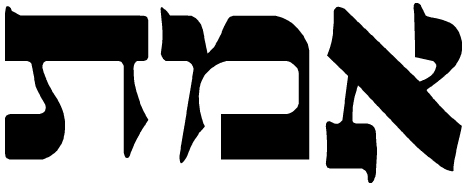Self-deception is the root of much ill.
This week’s double portion, Behar-Bechukotai, completes the book of Leviticus. Much of it is devoted to the sabbatical and jubilee years, which provide the land—and those who work it—with a prolonged rest period and serve as a reminder that, in the end, the earth belongs to God, rather than us. It is in this context that we find a verse admonishing against shady real estate deals: “Do not deceive one another but revere your God, for I, the Eternal, am your God.” (Leviticus 25:17)
But the Hasidic Rabbi Simcha Bunem of Przysucha shifts the focus of this verse with a brilliantly incisive bit of commentary. He taught: “Do not deceive anyone—not even yourself.”
Rabbi Bunem points to a profound psychological truth here, for of all the multifarious forms of deception in which we engage, none are so harmful as the ways we deliberately mislead ourselves.
Why do we do this? Often, to avoid pain. It can be terribly difficult to face the truth about poor choices that we have made and in which we have become invested and enmeshed. Even worse, we deceive ourselves in order to rationalize our doing things that, deep down, we recognize are wrong. I have always believed that almost all of our moral shortcomings are failures of willpower rather than knowledge. We know when we are transgressing. Yet we engage in self-deception to justify our misdeeds. We make excuses and conjure up mitigating circumstances—and, more damaging yet, eventually can come to believe our rationalizations. Our Rabbis called this unfortunate propensity for self-deception the yetzer ha-ra, the Evil Inclination. It is a huge barrier to transformative insight and personal growth.
If we wish to become better, wiser, more compassionate people, we must begin by being brutally honest with ourselves. This sort of clear-eyed appraisal is arduous, indeed—but it is the only way forward.
“Do not deceive anyone.” Even—or especially—yourself.
**********
Truth—in Hebrew, emet—is our midah/character trait for this week. The word begins with the letter alef, and ends with taf—the first and last letters in the Hebrew alphabet. For our Rabbis, this teaches that the world begins and ends with truth. In his book Everyday Holiness, Alan Morinis reminds us that we are all capable of seeing past deception, citing the words of Mussar teacher Eliyahu Dressler:
Even after the desire of one’s own heart have persuaded one to accept the false way as true, they still know in their heart of heart that the truth path is “truer” than the other one. . . . Every human being us has the faculty of determining in their own heart where the real truth lies.
Mussar Practice for this Week (from The Mussar Torah Commentary)
Set an intention to notice every time your instinct is to distort the truth in some way. When you notice that instinct arising, take a moment to ask yourself if there is an element of hidden truth that is yearning to be noticed.

No comments:
Post a Comment